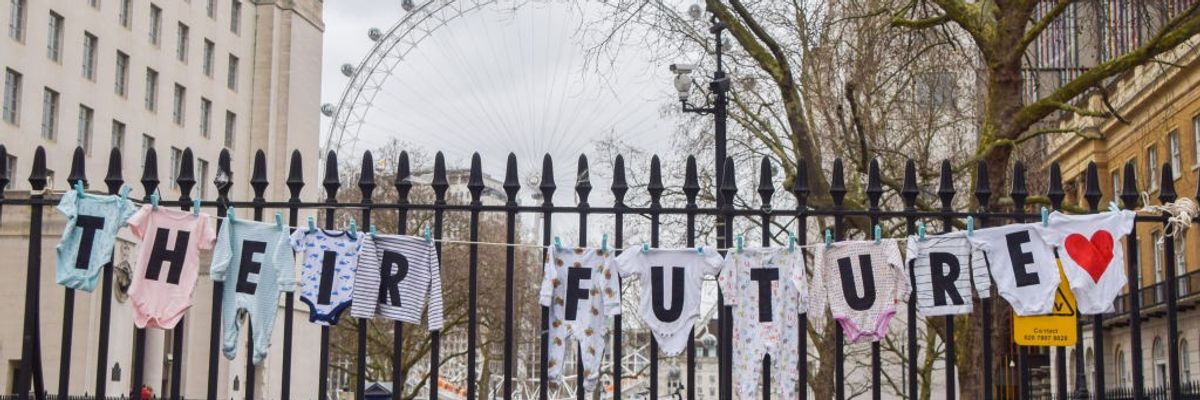When my son was born last spring, I found myself in a strange world, one in which parents—particularly moms—are expected to be perfect and completely in control of every detail of a child's life. Whether it's buying the most non-toxic diapers or deciding on the best baby-feeding philosophies, each with their own line of products, there is an obsessive culture of consumerist perfection about raising a child. Somehow, amidst an increasingly unstable social context, mothers are expected to ensure a child's every moment is crafted with the expertise of a veteran Montessori preschool teacher, a pediatrician, and a consumer product expert all in one. At the back of our minds we know we can't be all these things, but we still try.
In part, it's just marketing. Momfluencers, social media companies, and corporations profit by fueling our parenting anxieties—we've been convinced that if we just consume the right products, our children will grow into little geniuses who never feel pain. And perhaps it's also a coping strategy: It's all too human that, when confronted with massive systemic crises like a pandemic or climate change, parents might turn inward and focus on the things we (think we) can control. Maybe if we buy the right toys or say the gentlest–yet firmest–words, we can shield our kids from the broken world.
I don't mean to disparage the anxiety new parents have over everyday choices. I too have spent too much time on the internet "researching" which sippy cup to buy. I too have wondered if I'm buying the "right" toys. (Spoiler: My son prefers playing with bits of cardboard and my husband's sneakers over virtually any toy.) And I'm not suggesting we neglect our babies and let them scrounge for food while we pursue loftier causes.
It's painful to admit that the decisions of the powerful may shape our children's lives even more than we can. But it's true. And it's why I view activism as part of my job as a parent.
But the time and energy so many of us put into seeking to control every moment and product in our kids' lives is not proportional to the real impact on our children. It doesn't matter if I feed my toddler organic snacks now if in 15 years the climate crisis wipes out our global food system. An Instagrammable play area won't shield my children from the trauma of a society in which school shootings have become a new normal. And even if I become the most perfect mom in the universe, that won't protect my baby from a crumbling social contract or a loss of their civil rights.
To really help our kids, there is a better way for parents to spend our limited extra energy and resources: activism. As individuals, we can't control much about our children's futures. But if we join together with other parents and exercise our collective power, we stand a better chance of ensuring our kids–and all kids–can survive and thrive. It's painful to admit that the decisions of the powerful may shape our children's lives even more than we can. But it's true. And it's why I view activism as part of my job as a parent.
Our children are under assault from all directions. The powerful refuse to divest from fossil fuels, even while young people watch their futures' disappear. Trans children can't access medical care. Teens can't get reproductive care. School children can't read stories with Black and LGBTQ characters. Hate crimes against Black, Queer, Muslim, and Jewish people are escalating. State and local governments are defunding public schools. Children have to walk into school each morning wondering if a gunman might kill them or their friends. In every way, our kids need us to fight for them.
If it sounds overwhelming to confront societal crises on top of the regular demands of parenting, that's because it is. But it's even more overwhelming for our children, who can only be insulated for so long before the fractured world comes crashing in. And when it does, what could be more reassuring than seeing their parents fighting for them? We owe our kids whatever extra time and energy we have—whether it's five minutes or five hours—to work to dismantle the systems that hurt us all.
The good news is you can actually do activism with your kids in ways that are enriching rather than burdensome. The group I work with,
Climate Families NYC, plans kid-friendly protests replete with song, costumes, bubbles, and chalk. Our children love doing activism together, and when they hear about climate change in school or on the news, instead of feeling scared, they know they are part of the movement fighting back. Through meetings, playdates, and even direct actions outside Wall Street firms, we've built a community of mutual support.
Imagine if a million moms—and parents and caregivers (because this responsibility should be a shared one)—found an expectation to let go of and instead put the time, energy, and resources they gained into activism. Imagine the world we could build.
Years ago, I asked a close friend who had just had a baby if he felt different now that he was a parent. He said yes, what felt different was that now he was always a little afraid. Love for a child is carrying fear with you every day. But we have a choice of what to do with that fear—let corporations prey on us and our anxieties, siloed in our homes as we desperately try to be perfect, or channel our fears into action and community for the world our children deserve.
No one can do everything, but almost everyone can do something. Find your passion, find your people, and jump in. Like parenting, activism is never perfect, but it's what our kids, and we, really need.

